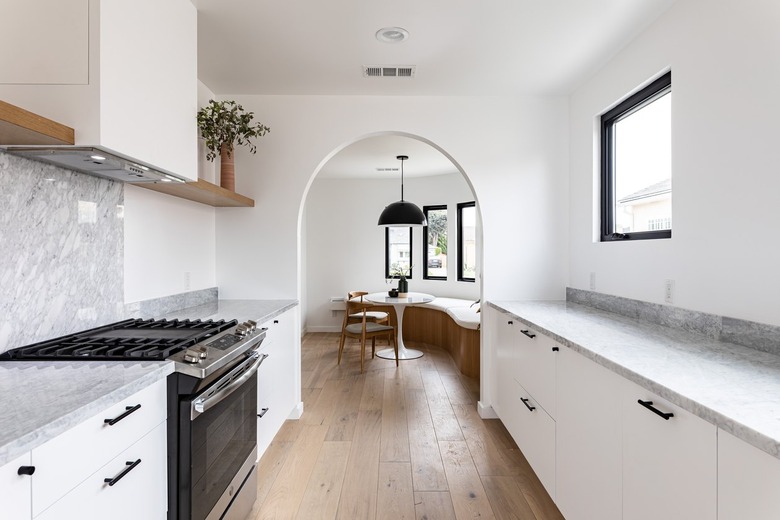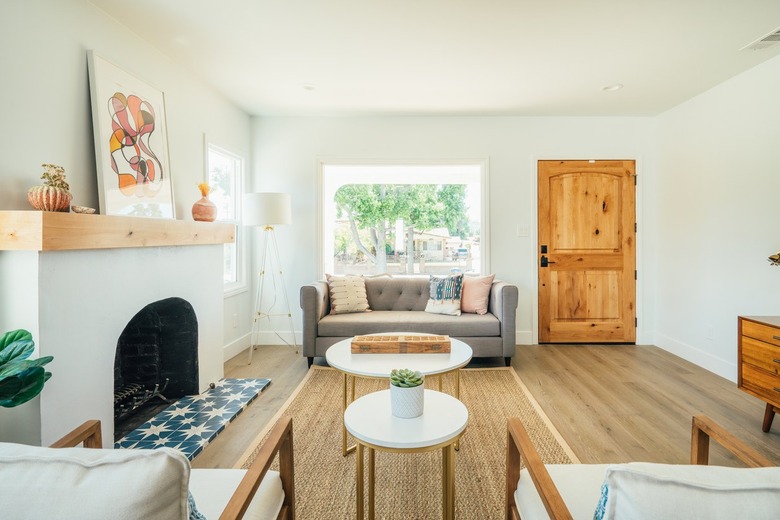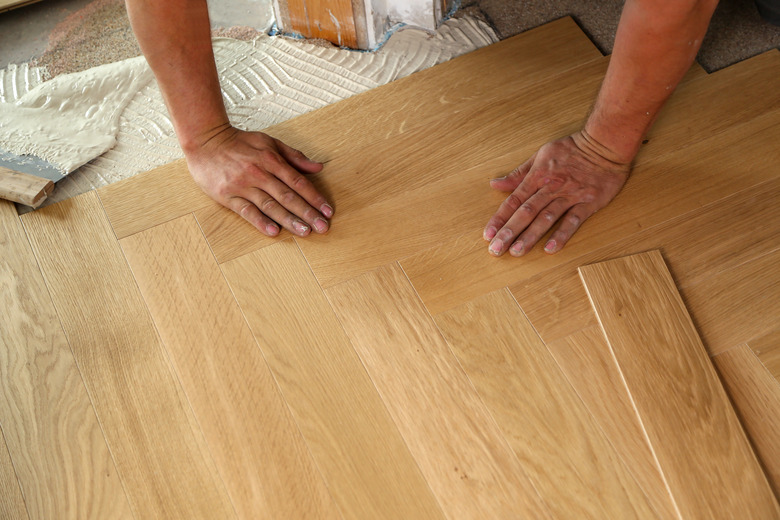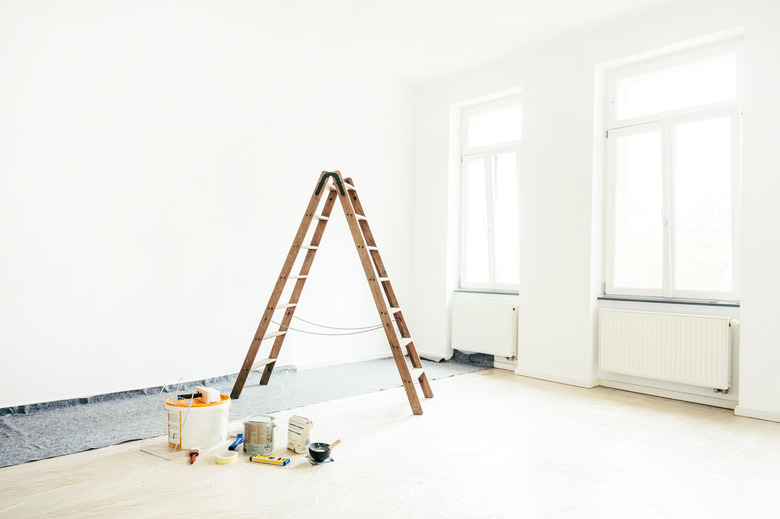How Much Will Home Renovations Cost In 2023?
We may receive a commission on purchases made from links.
Home renovation costs in 2023 are proving hard to predict. Rising inflation and loan interest rates in a slowing real estate market may mean that the remodeling industry could get a boost — or not. Rising interest rates typically keep potential buyers out of the housing market. Equity loans, though also subject to increasing interest rates, are somewhat more appealing to many homeowners due to the lower overall cost versus refinancing or purchasing a new home. However, fears of a recession are looming large, which could instill spending fears even when home prices are falling.
The fact that we're in the midst of a strange economy seems to mean that nobody is sure of what to expect. Despite the confusion, let's take a look at how much you'll want to budget for remodeling in the coming year.
Renovation Trends in 2023
Renovation Trends in 2023
Uncertainty in the marketplace is causing some to predict that the number of home renovation projects will increase, but the remodels themselves may be smaller than what some homeowners may have pursued in less turbulent times.
Renovation trends are likely to focus on interior design changes, updating spaces instead of rebuilding them and making structural changes, and getting creative with the home's current footprint rather than investing in building additions.
Factors That Affect Renovation Costs
Factors That Affect Renovation Costs
Supply chain issues and labor shortages are still at play throughout numerous industries. Although lumber prices are expected to stabilize somewhat in 2023, they won't be returning to pre-pandemic levels soon and will likely fluctuate with demand. But the cost of building materials as a whole is slowly rising, with some reports of mild price declines.
However, demand is hard to predict. The uncertainties mean it's anyone's guess as to how renovation costs will be affected. All things considered, it appears that remodeling material costs won't move much, which is good news if you're trying to plan a budget, even if it's not great news for saving money.
Budgeting for Your 2023 Renovation
Budgeting for Your 2023 Renovation
So, how do you budget for your 2023 home renovation? Your primary consideration should be whether or not the project is worth it based on its return on investment (or ROI). The national average for home remodeling is $49,000, with most remodels costing between $18,000 and $80,000. However, the return may be far less than what you spend, so it's important to choose your projects wisely in this economic environment, unless you plan on staying in your home for the foreseeable future.
The trend for 2023, however, leans toward more minor renovations, such as individual room remodeling or updating spaces. We'll explore those estimated costs. However your remodeling budget shakes out, expect to spend more on the same home improvement projects as you would have before the pandemic.
Renovation Costs by Project Size
Renovation Costs by Project Size
Typically, the smaller your renovation project, the more it will cost per square foot. A whole-house remodel will cost between $15 and $60 per square foot, while a single kitchen or bath remodel can have a price tag of $100 to $250 per square foot. Putting an addition on your home runs between $90 and $200 per square foot.
Renovation Costs by Project Type
Renovation Costs by Project Type
The expected trend in 2023 is toward smaller home remodeling projects. Despite higher per-square-foot pricing than whole-house renovations, smaller projects cost less overall, which could make them more appealing in an uncertain financial environment.
Individual Project Costs
Expect average prices to be around the following dollar amounts for upgrading individual home features.
- Flooring: $7,500
- Roofing: $9,000
- Painting: $3,000
- HVAC upgrades: $8,000
- Plumbing upgrades: $4,000
- Electronics: $3,000
- Window replacement: $2,000
Bathroom Remodeling Costs
Bathrooms are a popular target for remodeling. The average bathroom remodel cost is around $10,000 but can go as low as $2,500 or upward of $30,000 depending on the scope of the project and your choice of fixtures and amenities. Careful budgeting for a bathroom renovation is crucial due to the varied costs of all the steps involved. Here's how the average material prices break down for each category. Expect an additional average cost of around $2,800 for labor.
- Flooring: $3,000
- Plumbing work: $1,o00
- Fixtures and vanity: $5,000
- Shower: $3,000
- Paint: $50
- Cabinets: $300
Kitchen Remodeling Costs
Although remodeling a kitchen is often a costly undertaking, the scope of the project and the amenities you choose will have the most significant impact on your renovation budget. Choosing the right kitchen cabinets and cabinet design for your needs is essential. However, keep in mind that cabinetry is typically the most costly part of a kitchen renovation. The cost of labor and new appliances are also significant. Here are the average costs to expect for a typical $30,000 kitchen remodel:
- Cabinets and countertops: $12,000
- Labor: $6,000
- Flooring: $2,000
- Appliances: $4,000
- Plumbing and lighting: $2,000
- Drywall, doors, windows, and painting: $3,000
- Design and miscellaneous: $1,000
Cost to Build an Addition
Building an addition onto your home is a major renovation even at the smallest scale. The costs vary widely depending on what type of addition you're installing and its square footage. Regardless of what goes into the space, the added cost of digging and pouring a new foundation area raises the project price by about $4.25 to $6.25 per square foot. A kitchen addition will have extra costs associated with its new or extended plumbing. The same is true of a bathroom addition but likely to a lesser extent.
Adding a living room space or bedroom is less expensive than a kitchen addition. However, additional HVAC requirements should be considered in every addition installation situation regarding whether or not your current system can handle the extra load or how much it will cost to upgrade to a larger system.
The average cost of putting an addition on a home is around $46,000. But the typical range is vast, starting at about $5,000 and going up to and beyond $150,000.
Exterior Remodeling Cost
Extending your living space to the outdoors is still popular. You can add new life to your backyard and spend time outdoors without the cost of an interior remodel or addition. Consider installing a backyard kitchen, deck, patio, or pergola for far less than renovating your home.
Although high-end outdoor kitchens can set you back over $50,000, a basic build with all the necessities for cooking and entertaining can cost as little as $2,000 to $10,000 depending on your design and materials.
Adding a basic deck design built of pressure-treated wood to your outdoor space can be done for between $15 and $20 per square foot, while a simple patio runs between $8 and $20 per square foot. A DIY pergola kit starts at around $1,300, but a custom professional installation could set you back $10,000.
If all your home exterior needs is a new look provided by a paint job, expect an average price of about $5,000 to have the work done (for a 2,000-square-foot single-story house).
Remodeling Price Ranges
|
Remodel |
Cost Range |
|
Interior Paint |
$2,000 – $10,000 |
|
Bathroom Remodel |
$2,500 – $30,000 |
|
Kitchen Remodel |
$13,000 – $39,000 |
|
Addition |
$5,000 – $150,000 |
|
HVAC Upgrade |
$5,000 – $12,000 |
|
Basic Outdoor Kitchen |
$2,000 – $10,000 |
|
Deck or Patio |
$2,000 – $11,000 |
|
Pergola |
$1,300 – $10,000 |
|
Exterior Paint |
$2,000 – $13,000 |
DIY vs. Contractor Pricing
DIY vs. Contractor Pricing
How much you decide to budget for your home renovation in 2023 may come down to how much elbow grease you're willing to extend. Labor shortages continue to cause delays and price increases for contractors. Unfortunately, those costs must come from somebody's wallet—namely, yours. Labor cost percentage on a typical kitchen remodel runs between 30 and 35 percent, while contractor markup on already-rising material prices can add another 10 percent.
If you're willing to trade your time for some cost savings, DIY projects might be your answer for saving money or extending your budget to include a few luxury items in your plan.
Keep in mind that there's a price to pay for doing it yourself over hiring a general contractor. You'll be responsible for obtaining permits and being home for the inspectors when the time comes. Also, you'll likely be giving up several weekends performing potentially demanding labor tasks. Additionally, you'll need to learn safe work practices if you're not already an avid DIYer.
In some cases, hiring a contractor who is willing to share the workload with you might be to your financial advantage. Perhaps you could take on some of the less crucial renovation tasks, like cleanup, gathering materials, or doing your own demolition work, and hire an electrician and plumber to help with more specialized projects.
How to Save Money on Home Renovations
How to Save Money on Home Renovations
Beyond committing to some DIY effort, there are several ways to save money on your renovation project, whether you're doing the work or hiring a professional. The first rule is to stick to your budget. Overruns can get expensive quickly. Also, if you can pay out of your savings account instead of paying interest on a renovation loan, you'll be that much farther ahead of the money game.
With material expenses creeping upward, if you can reuse salvaged items, you can save big over buying new ones. You can often find inexpensive and possibly vintage household items at building material recycling stores or for sale online.
Whatever remodel you're taking on, another trick to saving cash is to purchase discount, lower-price materials where you can get away with it and spend the difference on more visible items. Consider foregoing the fancy appliances in exchange for more luxurious countertops or a high-end faucet. Similarly, you may want to skip hardwood floors in favor of more budget-friendly laminate ones. Keep a lookout for sales as well.
Finally, you may be losing money if you're simply throwing everything in a dumpster during demolition. First of all, the dumpster rental costs real money. Second, consider putting some of your old furnishings or building materials up for sale on a neighborhood classifieds website to earn some cash back.
2023 Renovation Costs: The Bottom Line
2023 Renovation Costs: The Bottom Line
One thing is for sure—remodeling costs seldom come down substantially. Each year, materials prices gain a few percentage points. What your home renovation will cost will depend mainly on the project scope. Despite seeing some materials costs backing away from the sharp increases over the past couple of years, the reality is that prices will continue to rise through the next year but most likely at a slower rate than in the recent past.



